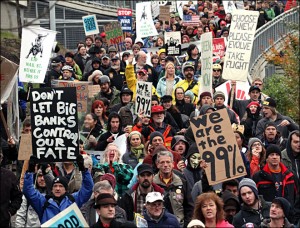When the phrase political action is bandied around it sends most people running for the television news rather than the dictionary. Most believe they know what political action entails, and they occasionally engage in it themselves, by  standing outside buildings and hollering along with others, listening to boring speeches by people who seek the spotlight, and then breaking for coffee at the corporate branded coffee shop which undersold their local café.
standing outside buildings and hollering along with others, listening to boring speeches by people who seek the spotlight, and then breaking for coffee at the corporate branded coffee shop which undersold their local café.
For many, the idea of political action is associated with joining groups, as though somehow in the magic of that joining, the group’s political declarations will become action. More than a few groups do more to hold back the movement, however; we can think of Ralph Ellison’s fine discussion of that topic in Invisible Man, or Doris Lessing’s similar analysis in The Good Terrorist and John Steinback’s In Dubious Battle. Other groups merely channel or obstruct the movement or merely provide a social setting for singles and those wishing to meet like-minded others. In that way, they are no different than online dating, or closing time at the bar.
Although I am reluctant to suggest that groups in the past have achieved nothing, or even little, I think that individual action must precede group action. Certainly the two are nowhere as near as mutually exclusive as we’d guess from people’s reports. Although the advances made by civil rights and women’s groups are real, and I don’t mean to disparage what they have accomplished, the inertia of the large group, the difficulty of rallying so many differing views, the tendency of crowds to descend into mobs, and the fad nature of popular movements do as much to prevent political action as to promote it. You can protest with your friends and still do something that effects change, although it might involve more of a commitment and be less exciting to post on facebook or twitter.
More than a few have noted that once the draft was discontinued in the United States during the Vietnam War, many of the most avid protestors disappeared. The war was evil, they were still certain of that, but much of their vehement fire had guttered into self-serving ash. Without a threat to themselves, it was difficult to get them onboard with the more effective activism, and instead they showed up to fewer and fewer protests until finally they found nothing in common with their youthful selves. We need an idea about a political movement that relies on more than such narcissistic motivations. I fight to get my union, but ignore your fight for the same. I recycle when there is a deposit on the bottle, but otherwise feed the landfill. My factory should have safety standards, but I buy from the sweatshop-derived Walmarts, for the rights of those workers are far away and therefore of less concern.
Setting aside the problems of groups for a moment—for joining and engaging in direct action can certainly be done at the same time—I think we need to take direct responsibility for our own actions. Rather than wait for the laws to change in order to force broader society, and by association us, to recycle, or use less electricity, or pay our taxes, we should begin those procedures on our own account. It must be as least as important for me to recycle as it is for me to protest a wasteful local company.
My very politically involved friend—if we can count endless meetings and coffee shop hollering—told me once that once the laws changed to force all people to recycle, he would be glad to do it. I was chastising him for throwing newspapers into the trash just because it was slightly easier. In his case, he thought he should wait to be forced rather than take responsibility himself. Of course, at the root of it, he was just too lazy and actually didn’t care about the environment enough to do even the slightest thing to ameliorate conditions today. He’d rather go to a demonstration about it.
The root of making a commitment to the cause is actions that confirm that we actually care about the issue. If a white person who is devoted to civil liberties is mistreating the people around them I would wonder where their sympathies really lay. For instance, Thomas Jefferson owned slaves even while he penned the Declaration of Independence: We hold these truths to be self-evident, that all men are created equal, that they are endowed by their Creator with certain unalienable Rights, that among these are Life, Liberty and the Pursuit of Happiness. Those are beautiful sentiments, if slightly tainted when he was halfway through writing and had to call for a slave to get more ink.
A friend once told me you can tell everything you need to know about someone on a first date by how they treat the serving staff in the restaurant. Likewise, how we interact with the world around us actually defines our political actions. My friend who has a problem with recycling has terrible gender politics when it comes to interpersonal relationships. He is more than willing to fight for women’s rights once the cameras are rolling, and although he knows more than most about the double day and unpaid work in the home, he can’t be bothered to cook or clean for himself and relies on his female partner to do it. Likewise, he never paid child support except when one of his wives, whose politics are more proactive, forced him to when she lived with him. Perhaps he needs a law to change his behaviour.
Some would correctly argue that these changes are limited in their effect, but if you are very wasteful in your own life how do you have the moral underpinning to ask a company to change its policy? The company stands to lose money, while you are merely too lazy to be bothered to rinse out tins and bottles. Also your seemingly tiny effort does not have as minuscule an effect as we might think. That same friend once told me his actions were a drop in the bucket. I reminded him that it was his bucket, and that is the only thing he has direct control over. The amount of garbage generated, the resources wasted, the animals killed, by one person adds up to a staggering amount by the end of their lives. We have seen in our own homes the amount of trash that makes its way to curb every day, and it is more than a truism that the average American throws away four and a half pounds of trash a day. That is a problem.
In my own life I try to live by the maxim of doing as little damage as possible. Try to be a good citizen, don’t reproduce and thus overpopulate the planet, don’t eat or kill another species if you can avoid it (mosquitoes are definitely an exception), try to avoid cruelty, shop locally (to avoid long distance shipping), eat vegetarian (which both avoids cruelty and saves resources), avoid consuming, recycle when I must buy an item in a container, reuse when I can, and correct those that would hate. I believe that we have very real alternatives that go beyond marching in the street once a year and going to a party which some in broader society would call a pointless demonstration of our right to be ignored.
I was at a demonstration once about the environment and as we stood in front and to one side of the legislature building,  for we were not allowed to block its entrance. I was struck by how little attention the MLAs and MPs paid us as they scurried back and forth from lunches. Ostensibly they work for us, but they blithely ignored us as they went inside. Mentally I followed them and saw how they stood at their windows and sighed in relief that we were gathered and accounted for instead of actually enacting real change elsewhere. We could have been doing both, but for many people the protest was as far as they were willing to go. After the event, protestors would be going home to houses and apartments very similar to the ones lived in by our representatives of government, and living or wishing to live in nearly the same way. We need more of a change than that, and I don’t think heaving our discontent outside a monolithic building is our most effective strategy.
for we were not allowed to block its entrance. I was struck by how little attention the MLAs and MPs paid us as they scurried back and forth from lunches. Ostensibly they work for us, but they blithely ignored us as they went inside. Mentally I followed them and saw how they stood at their windows and sighed in relief that we were gathered and accounted for instead of actually enacting real change elsewhere. We could have been doing both, but for many people the protest was as far as they were willing to go. After the event, protestors would be going home to houses and apartments very similar to the ones lived in by our representatives of government, and living or wishing to live in nearly the same way. We need more of a change than that, and I don’t think heaving our discontent outside a monolithic building is our most effective strategy.
What would be truly horrifying for the captains of industry, chortling behind the windows beside their bought politicians and looking down at us rather disdainfully, would be real change. If we each moved into cooperatives, divested from the major banks and lottery of the stock market, cut up our driving license so we could not drive, only bought from locally sourced shops, and in other ways made the changes that most terrify them, they would be beside themselves to entice us back to the liquor store and casino that is their offerings. Then they would come crawling back to gain our favour, once our actions cut into their wallets. As it is, they look at us and laugh, knowing that we will do little more than publicly deride that which we secretly and wholly support.
